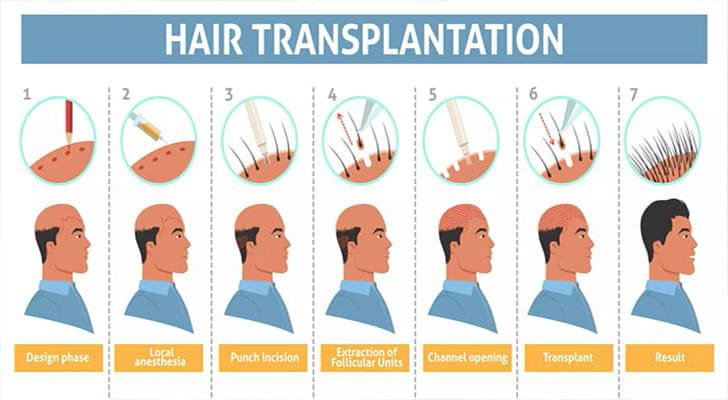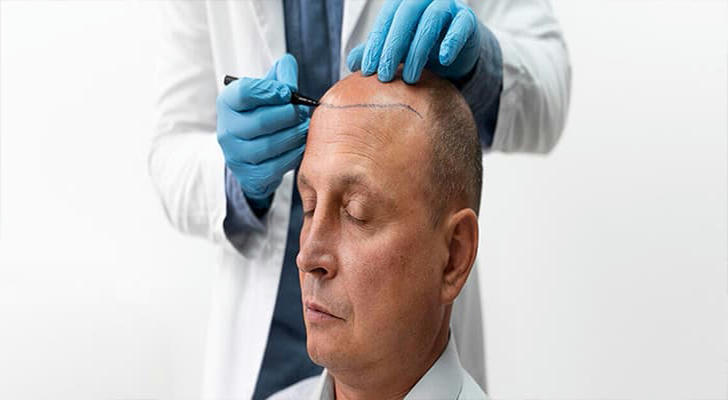Can hair transplant solve the problem of hair loss?

Hey everyone, are you struggling with hair loss too? With the pressures of modern life, hair loss has become a common problem for many of us. Looking in the mirror and seeing your thinning hair can really take a toll on your self-confidence, right? But don't worry, today I want to talk to you about hair transplants. Can hair transplant surgery really help us regain our confidence and have a full head of hair again? Next, let’s discuss who is suitable for hair transplantation and what changes it can bring to us.
Principles of hair transplant surgery
Hey guys, ever wondered how hair transplants actually work? Well, it's basically like taking healthy hair follicles from the back of your head and transplanting them to the areas where you're losing hair. Think of it as "relocating" your hair!
Why the back of your head, you ask? The hair follicles at the back of your head are less sensitive to male hormones and are less likely to fall out. So, we're taking these "tough" hairs and transplanting them to the areas where you're losing hair, and they'll continue to grow healthily.
The whole process is a bit like planting flowers. The doctor will take small grafts of hair from the back of your head and carefully transplant them to the thinning areas. After a while, these "seeds" will sprout and grow new hair.

What types of hair loss can be solved by hair transplantation?
Now that you understand how hair transplant surgery works, you might be wondering: What types of hair loss can it actually address?
Hair transplants are particularly effective for the following types of hair loss:
• Androgenetic alopecia (male pattern baldness): This is caused by male hormones causing hair follicles to shrink and eventually fall out. Hair transplants can effectively improve this condition by transplanting healthy hair follicles from the back of the head.
• Alopecia areata: This is a condition where hair suddenly falls out in patches, creating round or oval bald spots. Hair transplants can also be an effective treatment for alopecia areata.
• Traumatic alopecia: Hair loss caused by burns, scalds, surgery, etc., can also be restored through hair transplantation.
While hair transplants are effective in addressing these issues, they are not a cure-all. Conditions like alopecia totalis, alopecia universalis, telogen effluvium, and medication-induced hair loss, due to their complex causes, do not respond well to hair transplants.

What are the advantages of hair transplant surgery?
Now that we've discussed the types of hair loss that hair transplants can address, you might be wondering why so many people choose hair transplants. Well, there are numerous benefits to hair transplant surgery.
• Realistic effects: The hair grown after transplantation is highly consistent with the native hair in terms of appearance, growth direction, etc., and the effect is natural and beautiful.
• Strong durability: The transplanted hair follicles are permanent and will not fall out again, ensuring long-term hair transplant results.
• Minimally invasive: Using advanced FUE technology, the surgery is minimally invasive, with less bleeding and faster recovery.
• High safety: The surgery is performed in a strict medical environment by experienced doctors to ensure safety.
• Psychological improvement: Hair transplants can effectively improve self-esteem caused by hair loss and improve quality of life.

Conclusion
Do you know that the International Society of Hair Restoration Surgery (ISHRS), a renowned international organization, recognizes the effectiveness of hair transplant surgery? According to their survey, over 95% of hair transplant patients are satisfied with their results. Moreover, with the continuous advancement of medical technology, hair transplant technology is now very mature. Techniques like FUE hair transplantation are minimally invasive, recover quickly, and provide very natural results.
In summary, hair transplant surgery is a very effective treatment for many types of hair loss, especially androgenic alopecia and alopecia areata. By transplanting healthy hair follicles into areas of hair loss, hair transplantation can significantly improve hair density and restore natural hair growth. Of course, the success of hair transplant surgery also depends on the individual's specific circumstances and the skill level of the doctor.
